|
|
Asian Americans and Voting
By Leonard D. Chan
|
In the current election cycle, we our deluged with polls that rival local weather reports in frequency. One that should not be lost in the mix is the one done by various researchers called the National Asian American Survey.
The 2008 National Asian American Survey (NAAS) aims to discover "which Asian Americans vote, why they vote, who they vote for, and whether the Asian American vote is a partisan or a swing vote." NAAS was designed to discover and reveal details about Asian Americans that general polls of the American electorate miss. The creators of NAAS believe that their survey is the most thorough and accurate survey of the Asian American community done to date.
Here are some of the NAAS findings.
- At the time of the 2004 election, a large portion (over 32%) of adult Asian Americans could not vote because they were not citizens.
- Asian Americans have a lower rate of voter registration than most other groups, including African Americans. 580f respondents say they are registered and around another 16% more say that they will register in time for the 2008 presidential election.
- 730f currently register Asian Americans voted in the 2004 presidential election.
- NAAS's 2008 presidential election prediction of likely voters -
430f all adult Asian Americans (citizens and non-citizen residents)
650f all adult Asian American citizens
740f registered Asian Americans
- At the time of the survey (Aug 18, 2008 - Sept 26, 2008), preferences for President among likely voters was
24% McCain
410bama
10ther
34till undecided
- Asian American party identification
32 0dentify themselves as Democrats, 14 0dentify themselves as Republicans, and 54 0dentify themselves as being of some other party or as Independent/Non-partisan.
(See Table 5 for party identification)
- Although Asian American as a whole favored Obama by 410 24 0.000000or McCain, Vietnamese favored McCain by 510 24 0.000000or Obama.
(See Table 7 for voter preference)
- When respondents were asked to name the most important problems facing the nation, the economy came in first. When they were allowed to name more than one issue, the war in Iraq also was shown to be of major concern. Oil prices, jobs, immigration, and health care came in at a relatively bunched together third, and education and racism bunched at fourth.
(See Figure 2)
- Source of political information for Asian American citizens
335909a1a203f8ay attention to Asian language television
32 0et information from Asian language newspapers
20 0.000000rom Asian language radio
18 0.000000rom Asian language Internet sources
- 690f all Asian Americans discuss politics with family and friends whether or not they are registered or are citizens.
Some questions asked of Prof. Karthick Ramakrishnan of UC Riverside - one of the researches that helped to create NAAS.
On page four of the report, second paragraph, the one that begins "These numbers, however" it says that the US Census Bureau reveals that 550f Asian American citizens voted in 2004. When I checked with the Current Population Survey data from table 4a, I could not find or derive this 55 0.000000igure nor could I find the figures of "370f the over all Asian American adult population" or "730f white adults and 680f black adults voted in 2004." The figures I came up with are 44.10f the adult Asian Americans citizens, 29.80f all adult Asian Americans, 67.20f the adult White Non-Hispanic citizens, 65.80f all adult White Non-Hispanics, 600lack adult citizens, and 56.30f all Black adults voted.
The report's footnote to this paragraph states These figures from the Current Population Survey treat "don't know" and "no response" as missing data. Was this some adjustment that you made to come up with the figures that were reported? How did this adjustment work? Did you use some other data set from the CPS?
We had a survey that, when compared to the Census Bureau's American Community Survey data, had a higher proportion of citizens, and a lower proportion of native-born Asian Americans. It was also skewed by gender (54% male). We created a weight using all three factors to report out our results.
In terms of constructing a likely voter variable, we used political interest, self-reported registration and past voting, and stated likelihood of voting in November. We then chose to have a cutoff point on that distribution to produce results similar to the 2004 CPS.
In deciding on how to interpret the CPS statistics, we went with the convention of treating "no response" to the vote question as missing data. By doing so, we get an estimate of 56ting among adult
|
citizens for Asian Americans. If, instead, we treated that as "not voted" the estimate would go down to 45%.
We used the former metric as a basis of our likely voter calculations, based on conventions we are used to in political science. Using that metric, we predicted a higher turnout this year based on our observations from this election season. In the end, it very well may be true that our likely voter estimate is too optimistic. Unfortunately, the only way we can confirm this would be to compare it to the 2008 CPS data when it is released in the next two years.
The glaring difference between ethnic groups appears to be in the number of register citizens - Asian Americans citizens were the lowest group in the Nov. 2004 election at 51.8%. Did you notice this figure in your research and what do you think about it? Do you plan on finding out more information as to why Asian American citizens don't register to vote in the same numbers as the others?
Yes, apart from trying to produce a report that is useful for showing how Asian Americans will vote, the main goal of this survey is to tackle the question of why Asian Americans don't participate in high numbers, given their generally higher levels of educational attainment and income. We will be working on a book to answer this question.
On approximately Sept. 26 (the end of your survey), what was the percentage of All American that were undecided? Do you have some rough figure or survey you could point me to? I'm trying to understand if 340ndecided among AAs was very different from the general public or not - was it?
On surveys reported in realclearpolitics.com, the average on Sept. 26 was approx. 10%, much lower than for AAs.
Here's a general question - did you consider or actually have a control group to see the differences between Asian Americans and the general American populace? I'm most curious to know what the differences and similarities may be. For example in the section Behind the Asian American Vote, how do the AA issue statistics differ from the general American public? Regarding this section - what was the question you asked? Were the issues part of a multiple choice question or did the respondents come up with these issues on their own? Are there other similar surveys that you could point me to that show the general public's top issues?
We didn't have a control group (due to limited funding). The data are weighted to be nationally representative of the AA population, so you can compare that data to findings from other large national surveys. On the most important issue question, the respondents volunteered an answer, and the interviewers assigned to one of many codes (or coded it as "Other"). Best reference survey would be the Gallup most important problem question (March 13, 2008 ; Oct. 2-3, 2008).
Playing devils advocate here - do Asian Americans have unique issues that need addressing, did your survey find these issues, and if not do you and the others involved in this survey plan on doing further research on this topic? If we cannot discern the uniqueness of what are truly Asian American issues, how do we justify the need for having more Asian Americans in elected office?
Having minority electeds in office is not dependent on whether or not the issues they care about are unique. Today, all Americans care about the economy, but the particular ways in which communities are affected (job loss, home loss, higher tuition, failed investments) would be different. The issue of immigration is now a lower priority for AAs than before, but if the economy improves, it will likely come back up.
Other sources of information discovered as a result of reading the NAAS report
The Census Bureau has data on past elections in its Current Population Survey program (CPS election data). One of the interesting tables I found there was on the November 2004 election (table 4a). I modified this table (LC's modified 4a) to also show some additional statistics. One of the fascinating discoveries was that Americans actually do vote in fairly high percentages. 88.50f registered Americans voted in the 2004 election and among all the various subdivisions and ethnic groups the range was from 81.50 89.4%. Registered Asian American voters were in the middle of this range at 85.2%. The primary difference between all the various groups was in the percentages of registered voters - Asian Americans had the least number of registered citizens.
So the key among all groups appears to be in getting people to register - those that are registered seem to pretty much follow through on actually voting.
Another interesting table is Table 12. This table shows statistics on the reasons that people gave for not voting. The leading reasons - being too busy, with illness and disability coming in at second.
The Clerk of the House of Representatives also has an interesting website - clerk.house.gov. This office has official counts from all the congressional and presidential elections going back to 1920.
Last but not least, check out the Asian and Pacific Islander American Vote (APIA Vote) website APIAVote.org. APIA Vote has a bunch of information and resources and is still looking for volunteers for this coming election. Check them out.
|
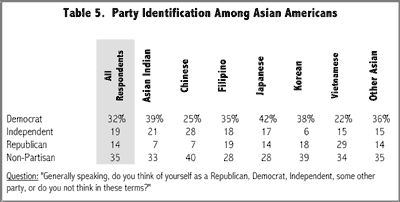
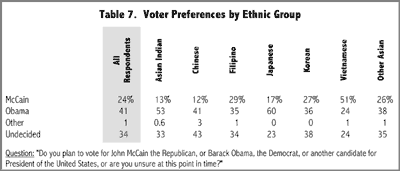

|
|
Up Coming Events
Here are some events that AACP will soon be attending.
|
Editor's Message
Hello Everyone,
Happy Halloween! If you're getting this in November, Happy All Saints' Day, All Souls' Day, and Undas or Araw ng mga Namayapa! Happy NaNoWriMo and Happy Election Day too! I'm a little late, but I'll throw in Chung Yeung and Diwali also. If you are unfamiliar with any of these events, I'll leave it to you as homework to figure them out. If I missed something or if you'd like to share how you celebrated these days, let me know.
Hey everyone, try to get over to see the performance of Hiroshi Kashiwagi's play "The Betrayed" on November 22. This is that great play in Hiroshi's memoir Swimming in the American and is also in his new collection of plays called Shoe Box Plays.
Professor Sue Fawn Chung is looking for your help, have a look at the announcement below.
Thanks Hiroshi and Prof. Chung for sending me your announcements.
Thank you so much Prof. Karthick Ramakrishnan for answering the questions I shot off to you with so little notice. I'll try to have the additional answer you gave in the website version of the newsletter.
Thank you Sharon and Jean for your help with some of the book descriptions.
One last note: the November newsletter, like in past years, will be combined with the December newsletter and will come out in early December.
That's all for now.
Leonard Chan
Executive Editor
Give Us Your Feedback
Please feel free to send us your reviews, comments, and book suggestions. You can contact us by going to the following page and sending an email to us through the online form -
http://asianamericanbooks.com/contact.htm
|
|
Miscellaneous Announcements and Thoughts
Wanted
Information on Chinese American Historic Sites
Sue Fawn Chung, Associate Professor of History at the University of Nevada, Las Vegas and member of the Board of Advisors of the National Trust for Historic Preservation, is doing a study focusing on historic Chinese American sites from earliest times through 1965 with the specific aim of giving historical background to allow sites to become eligible for state and national registers. This is a major step in trying to preserve the achievements of Chinese Americans. This study for the National Park Service will be put online.
If you know of a site (and have a photograph of it, but this is not necessary) that should be mentioned, please e-mail the information to us at AACP and we will forward the information to Prof. Chung. Please include the address of the site and if you know a contact person, the person's name. The study should be online by the end of 2009.
Former Secretary of State Powell on Muslims in America
Some of you may have heard part of Former Secretary of State Colin Powell's Meet the Press interview. However, if you only caught it through the small news clips, you may have missed Powell's statement about Muslim Americans. In his statement Sec. Powell reaffirmed a point I made in our March 2008 newsletter - "What's so wrong about having a Muslim president?" Thanks Sec. Powell for bringing this point to a wider audience. Here's what Sec. Powell had to say -
…it is permitted to be said such things as, "Well, you know that Mr. Obama is a Muslim." Well, the correct answer is, he is not a Muslim, he's a Christian. He's always been a Christian. But the really right answer is, what if he is? Is there something wrong with being a Muslim in this country? The answer's no, that's not America. Is there something wrong with some seven-year-old Muslim-American kid believing that he or she could be president?
|
Yet, I have heard senior members of my own party drop the suggestion, "He's a Muslim and he might be associated terrorists." This is not the way we should be doing it in America.
I feel strongly about this particular point because of a picture I saw in a magazine. It was a photo essay about troops who are serving in Iraq and Afghanistan. And one picture at the tail end of this photo essay was of a mother in Arlington Cemetery, and she had her head on the headstone of her son's grave. And as the picture focused in, you could see the writing on the headstone. And it gave his awards--Purple Heart, Bronze Star--showed that he died in Iraq, gave his date of birth, date of death. He was 20 years old. And then, at the very top of the headstone, it didn't have a Christian cross, it didn't have the Star of David, it had crescent and a star of the Islamic faith. And his name was Kareem Rashad Sultan Khan, and he was an American. He was born in New Jersey. He was 14 years old at the time of 9/11, and he waited until he can go serve his country, and he gave his life. Now, we have got to stop polarizing ourself in this way.
It's Time to Vote
It's that time of year again - time to vote. I recently was on the email sidelines of a slight falling out between an aunt and niece over who they supported for president. The problem occurred when the aunt sent out a group email to everyone on her list that showed her preference for the up coming election. The niece fired back that she was not of the same belief and was very unhappy with the email. Needless to say, she told this to everyone on the email list.
Frankly, I think it should be all right for everyone to show their colors at this time of the year. If an aunt can't have an intelligent discussion with her niece about politics during election season, then we're headed down the wrong road of balkanization. If we are to have a better community and country, we need to find ways to calmly and intelligently communicate with one another.
Anyway, this brought me back to an editorial I wrote back in October of 2004 call Vote Cancellation by Ignorant Voters. I had another read of it and it still looks pretty good. I'll reproduce it here for those of you that did not get to read it back then. Enjoy!
|
Vote Cancellation by Ignorant Voters
An Editorial by Leonard Chan and
Edited by Philip Chin
(First Published in October 2004)
|
"Voters should pass a political literacy test." What was I reading? While on vacation in Maui, I picked up a local newspaper (Maui Time Weekly). One editorial in particular caught my eye - "Triumph of the Stultocracy: Voters should pass a political literacy test." (Sorry, the article was removed from the Maui Time website.)
What was the writer, Ted Rall, talking about? After reading his piece with some chuckles and my head often shaking in agreement, I was amazed at the tangent that Rall was taking from the standard line of encouraging people to vote.
Rall's basic point was that recent polls and man on the street interviews (see the poll done by the Program on International Policy Attitudes indicating voter ignorance - sorry, the page was removed) have shown that a large percentage of the general public is ill equipped to vote and thus should not. Rall goes on to suggest that people should pass a political literacy test before voting. It was radical and a bit disconcerting that he made some sense.
He was right, why should I do so much studying of election candidates and issues, if other people that do far less can so easily cancel my vote? Shouldn't all the good citizens that do their political homework be upset at ignorant voters? Why should anybody that has a pulse vote? Had America become "a stultocracy: government by morons, for morons?"
To quash these anti-democratic thoughts, I searched for reason to vote.
Reasons to Vote
Empowerment
The first reason that I could think of was empowerment - the psychological importance of feeling in control. What contributes to happiness is feeling that you have some control of your life. Voting may not give you a great sense of control, but it is a very rare case where nothing you vote for wins. Even the smallest win helps us feel some measure of control. Don't you feel a bit of joy when a sports team you cheer for wins? You didn't have much to do with the win, but don't you feel like you had something to do with it? The same can be said for voting - you may not consider your vote as meaning much, but it is satisfying to know something you voted for won.
Winning Isn't Everything
Contrary to the popular sports axiom, winning isn't really everything. Feeling that you made your voice heard is also important. Even when you are on the losing side, you have the comfort of knowing that many people feel the same way you do. Knowing the score gives us a measure of the progress of our causes. It's what keeps us from taking up arms every time we don't get our way.
Elections are the ultimate polls, they are the official record, and they are the means by which the citizenry creates its government. Smart politicians will not ignore the losing side if the percentages are high enough.
Who's Right?
Even if you guess, you have a 50�hance of being right on yes and no issues or two people races. Even the experts that study the candidates and the issues can have widely opposing points of view. People that are fully knowledgeable still disagree.
How do you know that you're right? Just because you may be armed with knowledge and logic that support your point of view, facts can often be interpreted in many ways. A strong belief in one's own correctness can often hinder one's ability to understand nuances that make candidates and issues gray rather than black or white.
Sometimes the things that we want can have unintended consequences that we could not have foreseen - we've all experienced, read, or seen stories of such tales (take almost any Twilight Zone episode :). So why should we assume that a well-informed person would make any better decision than a less informed one?
Connecting With Your Neighbors
Voting is the least that one can do to participate in society. Voting can reengage people to |
think beyond their own little worlds. This is important for complex societies such as our own. Most of us don't live on remote islands or in the woods where our actions might only affect ourselves. The completely libertarian system, where everybody does whatever they want, doesn't work when almost anything you do has some ramifications to your fellow man. You need to sometimes work with your neighbors, connect with them, make your voice heard, and vote.
Back to Outrage and What We Can Do
Please don't misconstrue my arguments above as advocacy for ignorant voters. I am upset to hear that others spend so little time to learn about the issues and the candidates, when I take it much more seriously. I don't like having my vote canceled out by some ignorant and/or illogical person on the other side. However, Ted Rall's idea of a competency test before voting is misguided and would not work. The public would never accept a political test in order to vote. I'm not even sure if it would be constitutionally legal.
Stay Informed
Part of the solution is with all of us that claim to know. Yes, especially you educators and people in the media. The scary thing about an ignorant populace is how people with power, money, and media access can manipulate the less knowledgeable voter. To combat the influences of power and money we need to work hard at staying informed with good and reliable information.
It's your duty as a citizen or even as a non-voting resident to stay informed. We must learn to ignore sound bites in commercials, short flyers, and comedic entertainment. Rather than going for bites, go for the whole meal - read, listen, and watch, but choose your sources wisely. Thanks to PBS, NPR, and the Internet, we can find good information. It's sometimes tough to know when you are hearing or reading political spin, but there are some good sources out there. You have to work at it. But I know you're already a pro at this since you've found us :).
Stay Engaged
Be concerned, care about making a difference for good, and empathize with your neighbors. Even participating in discussions with friends and relatives can help. Philip, AACP's esteemed newsletter co-editor, often trades political jabs with all of us, forcing us to do our homework and stay on our toes. If we can't defend our positions, perhaps our beliefs are faulty. Political discussions can be productive, but don't let it get personal and don't let it ruin your friendships.
Volunteer for Non-Violent Causes
Note the emphasis on non-violent. If your cause is true, you will not need arms and violence. All that is required in a functional society is a lot of persistence and hard work. Working with non-profit organizations can be both good for society and for your own mental health. It feels good to be actively involved in a cause rather than just sitting on the sidelines complaining. Give it a try - we, as a non-profit organization, are always looking for help :).
Give a Helping Hand to Inform Others
Teachers are in an enviable position, but there are other ways to multiply your efforts. For example, this newsletter, I hope, is doing something to contribute to your knowledge base. Doing the research for it certainly helps me learn many things. As you educate others, keep in mind that you don't necessarily have all the answers. To do so would demonstrate a type of arrogance that may reduce your power to persuade.
And If You Don't Know…
If you don't know or don't have an educated guess, it's okay not to vote. Every election usually has a zillion issues and candidates to consider. I often find it impossible to make up my mind or learn about everything on the ballot. Do what you can and be happy for just participating or just sit back, let someone else do the heavy lifting, and don't complain.
Keep in mind that you're the fourth branch of government. At every election you become the boss - you have the power to fire or hire; you are in control. So use your power wisely and I hope your candidates and issues win (provided that they're in agreement with mine :-).
|
ADDITIONS TO OUR WEBSITE
The following books are discounted for subscribers to our newsletter. The discounts on these books end November 19, 2008.
|
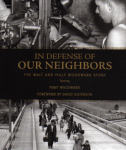
|
In Defense of Our Neighbors
The Walt and Milly Woodward Story
By Mary Woodward
2008, 152 pages, Hardback.
This book takes place on Bainbridge Island, in Washington State from the 1930s to 1945. It is a historical perspective of the community and the Japanese residents who lived and worked there before Pearl Harbor was bombed. Walt and Milly Woodward, who owned and wrote for the Bainbridge Review, chronicled the life events of their Japanese friends and families while they were living in the Manzanar interment camp. This book is written by Walt and Milly's daughter Mary with inclusions of Walt and Milly's own writings. It movingly shows how their friends were discriminated by the government, which stripped them of their property and livelihoods, but how their friends were still able to maintain their dignity through their incarceration.
View Additional Information
ORDER -- Item #3526, Price $24.95 ... for newsletter subscribers $19.96
|

|
The Dragon's Child
A Story of Angel Island
By Laurence Yep, Kathleen S. Yep, Dr.
2008, 144 pages, Hardback.
The Dragon's Child is the story of a boy who comes to the US from China in the 1920s. The story is based on prolific author Laurence Yep's own father. Although it is a novel, it draws upon the family research done by Laurence Yep and his niece Kathleen Yep. With over 500 pages of archival immigration files found on the family, Laurence Yep was able to deduce a story that recreates the lives of his father and relatives. As Laurence Yep describes in the author notes, "...historical fiction is more than a record of dates and statistics: it should be a dialogue with the dead. And so this novel is a conversation with my father about his long journey to Angel Island and America."
View Additional Information
ORDER -- Item #3529, Price $15.99 ... for newsletter subscribers $12.79
|
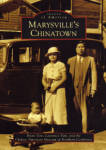
|
Images of America
Marysville's Chinatown
By Brian Tom, Lawrence Tom, and the Chinese American Museum of Northern California
2008, 128 pages, Paperback.
Marysville, located in California's Central Valley is home to one of the earliest continuously populated Chinese communities in California's gold country. This book tells the history of the early Chinese immigrants to Northern California through personal and archival photographs from the late 1800's through present day. The Bok Kai Temple built in 1854 and relocated in 1880 to it's present site has been a mainstay of the Marysville's Chinese community and the annual Bok Kai Festival is one of the largest celebrations of it's kind. The newly opened Chinese Museum of Northern California is also located in Marysville and has an objective to 'preserve and interpret the history of Chinese in America' as well as to house Chinese artifacts.
View Additional Information
ORDER -- Item #3525, Price $19.99 ... for newsletter subscribers $15.99
|

|
Asian Americans and Politics
Perspectives, Experiences, Prospects
Edited by Gordon H. Chang
2001, 425 pages, Paperback.
As our nod to the coming Nov. 2008 election, we are featuring this still discerning 2001 collection of essays written by Gordon H. Chang, Don T. Nakanishi, Pei-te Lien, Neil T. Gotanda, Frank H. Wu, Bruce E. Cain, and others contributors, on topics of Asian Americans and Politics.
View Additional Information
ORDER -- Item #3527, Price $27.95 ... for newsletter subscribers $22.36
|
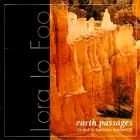
|
Earth Passages
Journeys Through Childhood
By Lora Jo Foo
2008, 95 pages, Hardback.
Earth Passages relates the story of growing up in San Francisco's Chinatown in the late 1950's and early 60's. It tells of the harsh childhood the author experienced as a young girl whose mother worked six and often seven days a week to make ends meet. Lora Jo Foo began working at the age of nine and had to grow up fast, but ultimately the book tells of how she overcame the harshness of her childhood and how she has reconciled with her past through her photography. The stories are told in 28 vignettes and are paired with beautiful nature photographs taken by the author as an adult.
View Additional Information
ORDER -- Item #3528, Price $32.95 ... for newsletter subscribers $26.36
|
Copyright © 2008 by Asian American Curriculum Project, Inc. (a non-profit organization since 1970)
Visit our website at AsianAmericanBooks.com
|